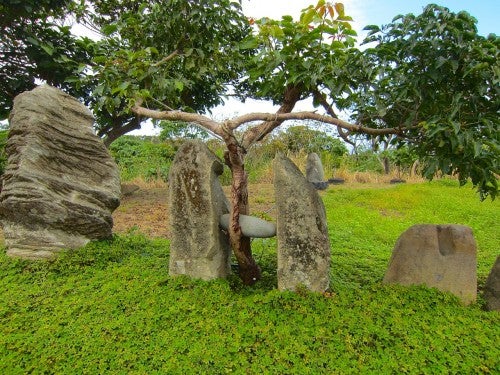
Yu and her father Jiunn, a native of
Taiwan, at National Taiwan University in Taipei
Pei-Lin Yu, assistant professor of anthropology, will travel to Taiwan in December 2016 on a Fulbright Scholar Research award. Yu will spend seven months among indigenous Paiwan and Amis tribal groups on the mountainous east side of the island, comparing the amount of labor needed for indigenous crops with modern industrialized crops.
For her Fulbright award, Yu will partner with colleagues at National Taiwan University of Taipei including Su-Mei Lo, ethnobotanist, Maa-ling Chen, archaeologist, and Jer-Ming Hu, plant microbiologist. The team is interested in seeing if indigenous agricultural crops and techniques are more resilient and adapted to local conditions compared to modern crops. The team will compare labor inputs for both types of farming to inform this comparison.

A fallow field in a Paiwan village shows use of Neolithic stone markers in a
living cultural system that incorporates indigenous spirituality into agricultural life.
The team’s hypothesis is that root crops, such as taro, are among the best adapted, though less productive, of indigenous Taiwanese crops. Thus they are more likely to have been stepping stones to more intensive rice and millet agriculture around 6,000 years ago. Some of these crops are the ancestors of the “canoe crops” that traveled with ancient pioneering seafarers to colonize the islands of the Pacific in the largest known prehistoric expansion.
Looking forward, the hypothesis predicts that these resilient indigenous crops are more likely to succeed under changing conditions, including climate change impacts like extreme storm events and droughts being experienced in Taiwan today. This may hold the key to future diversification of Taiwan’s agriculture, and improve the sustainability of an agricultural way of life for Indigenous Taiwanese communities in their ancestral lands.
At the end of the seven-month field season, Yu will analyze the data and present the team’s findings to academic and government experts, the Taiwan National Museum of Prehistory, and most importantly to indigenous communities and schools. Yu has more than 20 years experience in working with indigenous communities in North and South America on archaeological research, cultural heritage, climate change and burial repatriation.
Boise State is among the top U.S. universities in producing student and faculty Fulbright Scholars in the country’s premier international educational exchange program. Yu’s award is the first from Boise State to be finalized for the 2016-2017 program.
BY: BRADY W MOORE PUBLISHED 10:18 AM / MARCH 31, 2016